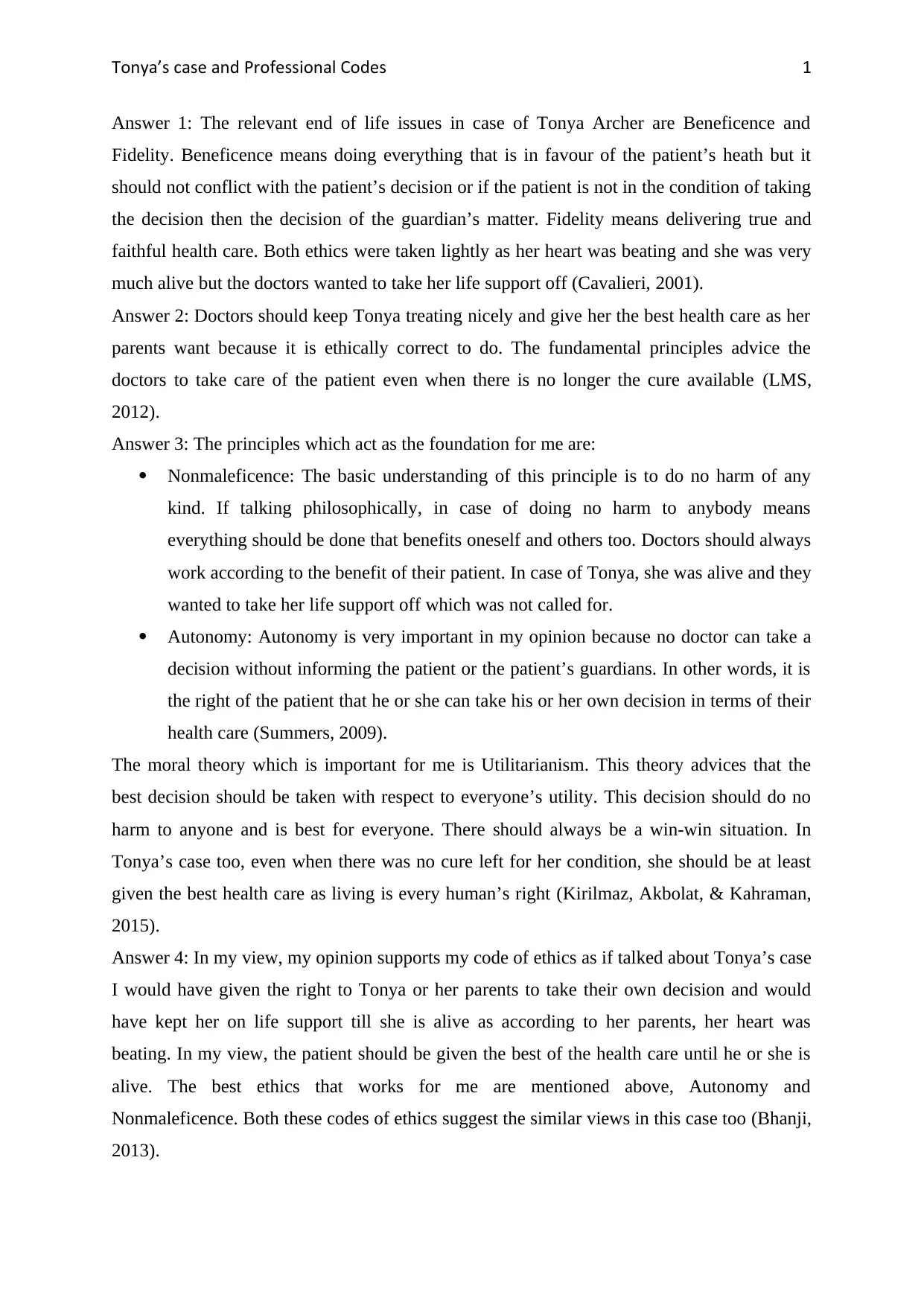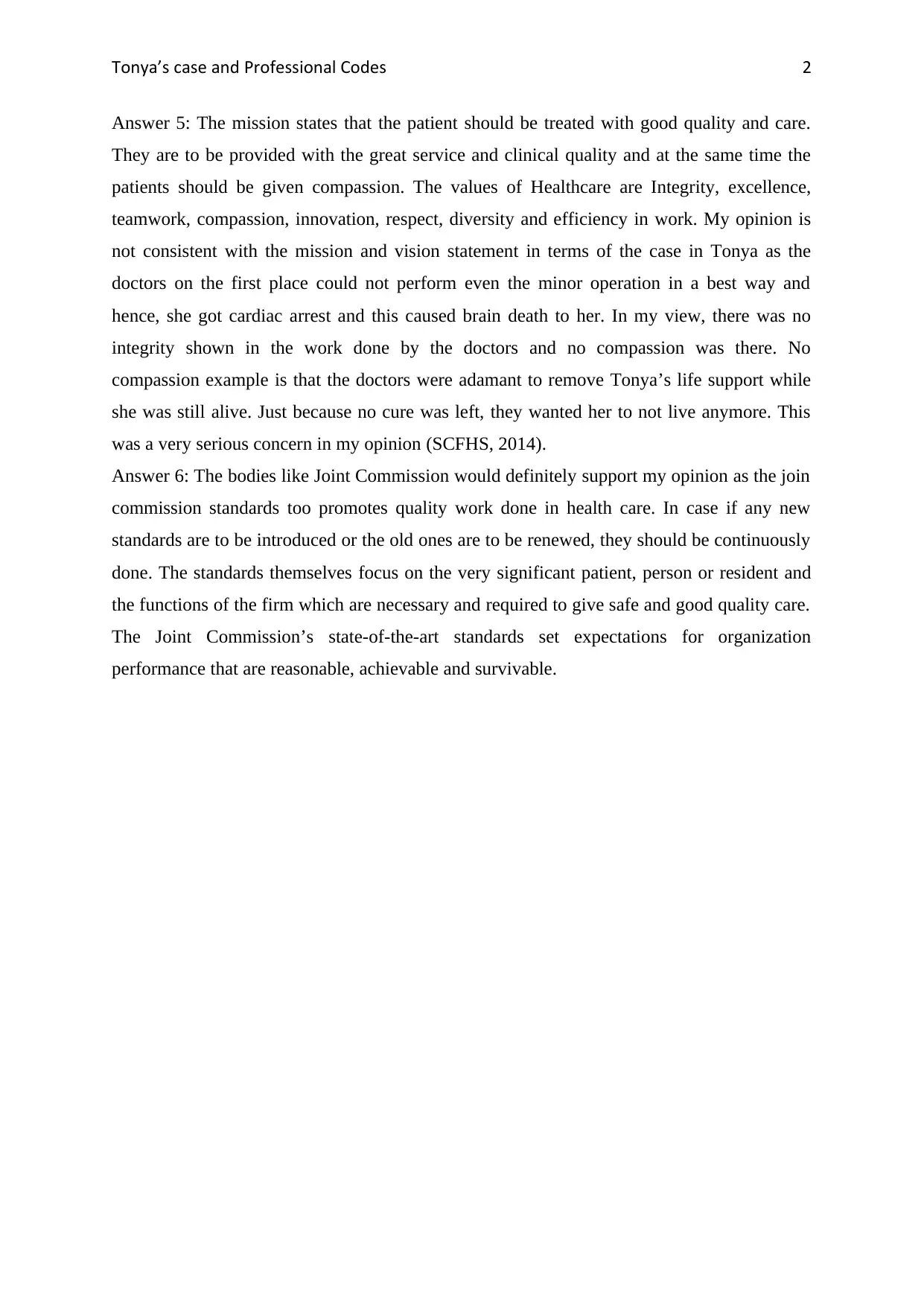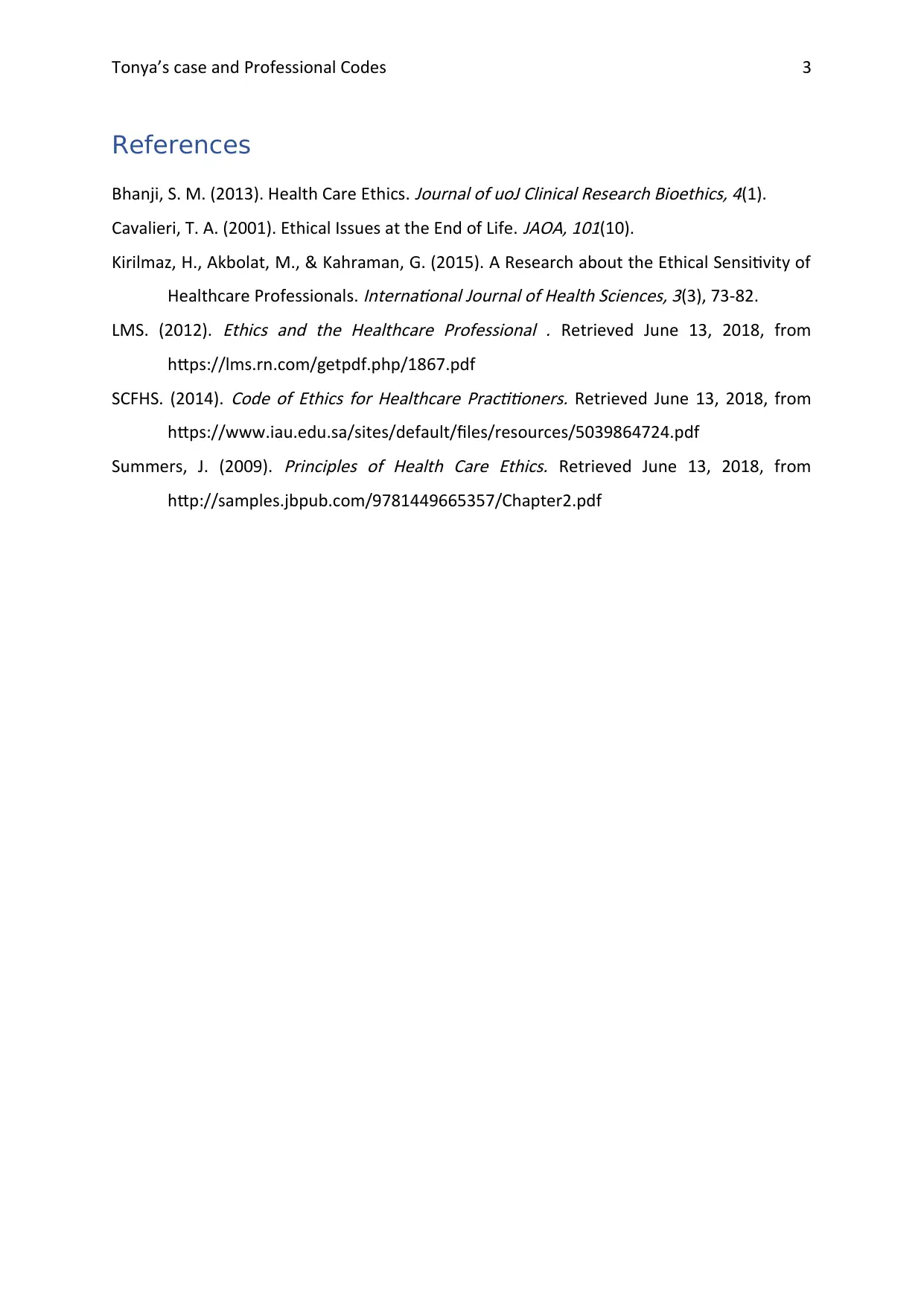Tonya Archer's Case: A Deep Dive into Ethics & Professional Codes
VerifiedAdded on 2023/06/11
|4
|1023
|138
Case Study
AI Summary
This case study analyzes the ethical issues surrounding Tonya Archer's case, focusing on beneficence, fidelity, autonomy, and nonmaleficence. The author argues that Tonya should have received the best possible care and her parents' wishes should have been respected. The author's personal ethics align with autonomy and nonmaleficence, emphasizing patient rights and avoiding harm. The author finds inconsistencies between the healthcare provider's mission and vision statements and the care provided to Tonya, particularly concerning integrity, compassion, and quality. The author believes organizations like the Joint Commission would support the opinion that quality healthcare should be prioritized. The study concludes by emphasizing the importance of ethical standards and patient-centered care.

Running head: Tonya’s case and Professional Codes
Tonya’s Case and Professional Codes
Tonya’s Case and Professional Codes
Paraphrase This Document
Need a fresh take? Get an instant paraphrase of this document with our AI Paraphraser

Tonya’s case and Professional Codes
Answer 1: The relevant end of life issues in case of Tonya Archer are Beneficence and
Fidelity. Beneficence means doing everything that is in favour of the patient’s heath but it
should not conflict with the patient’s decision or if the patient is not in the condition of taking
the decision then the decision of the guardian’s matter. Fidelity means delivering true and
faithful health care. Both ethics were taken lightly as her heart was beating and she was very
much alive but the doctors wanted to take her life support off (Cavalieri, 2001).
Answer 2: Doctors should keep Tonya treating nicely and give her the best health care as her
parents want because it is ethically correct to do. The fundamental principles advice the
doctors to take care of the patient even when there is no longer the cure available (LMS,
2012).
Answer 3: The principles which act as the foundation for me are:
Nonmaleficence: The basic understanding of this principle is to do no harm of any
kind. If talking philosophically, in case of doing no harm to anybody means
everything should be done that benefits oneself and others too. Doctors should always
work according to the benefit of their patient. In case of Tonya, she was alive and they
wanted to take her life support off which was not called for.
Autonomy: Autonomy is very important in my opinion because no doctor can take a
decision without informing the patient or the patient’s guardians. In other words, it is
the right of the patient that he or she can take his or her own decision in terms of their
health care (Summers, 2009).
The moral theory which is important for me is Utilitarianism. This theory advices that the
best decision should be taken with respect to everyone’s utility. This decision should do no
harm to anyone and is best for everyone. There should always be a win-win situation. In
Tonya’s case too, even when there was no cure left for her condition, she should be at least
given the best health care as living is every human’s right (Kirilmaz, Akbolat, & Kahraman,
2015).
Answer 4: In my view, my opinion supports my code of ethics as if talked about Tonya’s case
I would have given the right to Tonya or her parents to take their own decision and would
have kept her on life support till she is alive as according to her parents, her heart was
beating. In my view, the patient should be given the best of the health care until he or she is
alive. The best ethics that works for me are mentioned above, Autonomy and
Nonmaleficence. Both these codes of ethics suggest the similar views in this case too (Bhanji,
2013).
1
Answer 1: The relevant end of life issues in case of Tonya Archer are Beneficence and
Fidelity. Beneficence means doing everything that is in favour of the patient’s heath but it
should not conflict with the patient’s decision or if the patient is not in the condition of taking
the decision then the decision of the guardian’s matter. Fidelity means delivering true and
faithful health care. Both ethics were taken lightly as her heart was beating and she was very
much alive but the doctors wanted to take her life support off (Cavalieri, 2001).
Answer 2: Doctors should keep Tonya treating nicely and give her the best health care as her
parents want because it is ethically correct to do. The fundamental principles advice the
doctors to take care of the patient even when there is no longer the cure available (LMS,
2012).
Answer 3: The principles which act as the foundation for me are:
Nonmaleficence: The basic understanding of this principle is to do no harm of any
kind. If talking philosophically, in case of doing no harm to anybody means
everything should be done that benefits oneself and others too. Doctors should always
work according to the benefit of their patient. In case of Tonya, she was alive and they
wanted to take her life support off which was not called for.
Autonomy: Autonomy is very important in my opinion because no doctor can take a
decision without informing the patient or the patient’s guardians. In other words, it is
the right of the patient that he or she can take his or her own decision in terms of their
health care (Summers, 2009).
The moral theory which is important for me is Utilitarianism. This theory advices that the
best decision should be taken with respect to everyone’s utility. This decision should do no
harm to anyone and is best for everyone. There should always be a win-win situation. In
Tonya’s case too, even when there was no cure left for her condition, she should be at least
given the best health care as living is every human’s right (Kirilmaz, Akbolat, & Kahraman,
2015).
Answer 4: In my view, my opinion supports my code of ethics as if talked about Tonya’s case
I would have given the right to Tonya or her parents to take their own decision and would
have kept her on life support till she is alive as according to her parents, her heart was
beating. In my view, the patient should be given the best of the health care until he or she is
alive. The best ethics that works for me are mentioned above, Autonomy and
Nonmaleficence. Both these codes of ethics suggest the similar views in this case too (Bhanji,
2013).
1

Tonya’s case and Professional Codes
Answer 5: The mission states that the patient should be treated with good quality and care.
They are to be provided with the great service and clinical quality and at the same time the
patients should be given compassion. The values of Healthcare are Integrity, excellence,
teamwork, compassion, innovation, respect, diversity and efficiency in work. My opinion is
not consistent with the mission and vision statement in terms of the case in Tonya as the
doctors on the first place could not perform even the minor operation in a best way and
hence, she got cardiac arrest and this caused brain death to her. In my view, there was no
integrity shown in the work done by the doctors and no compassion was there. No
compassion example is that the doctors were adamant to remove Tonya’s life support while
she was still alive. Just because no cure was left, they wanted her to not live anymore. This
was a very serious concern in my opinion (SCFHS, 2014).
Answer 6: The bodies like Joint Commission would definitely support my opinion as the join
commission standards too promotes quality work done in health care. In case if any new
standards are to be introduced or the old ones are to be renewed, they should be continuously
done. The standards themselves focus on the very significant patient, person or resident and
the functions of the firm which are necessary and required to give safe and good quality care.
The Joint Commission’s state-of-the-art standards set expectations for organization
performance that are reasonable, achievable and survivable.
2
Answer 5: The mission states that the patient should be treated with good quality and care.
They are to be provided with the great service and clinical quality and at the same time the
patients should be given compassion. The values of Healthcare are Integrity, excellence,
teamwork, compassion, innovation, respect, diversity and efficiency in work. My opinion is
not consistent with the mission and vision statement in terms of the case in Tonya as the
doctors on the first place could not perform even the minor operation in a best way and
hence, she got cardiac arrest and this caused brain death to her. In my view, there was no
integrity shown in the work done by the doctors and no compassion was there. No
compassion example is that the doctors were adamant to remove Tonya’s life support while
she was still alive. Just because no cure was left, they wanted her to not live anymore. This
was a very serious concern in my opinion (SCFHS, 2014).
Answer 6: The bodies like Joint Commission would definitely support my opinion as the join
commission standards too promotes quality work done in health care. In case if any new
standards are to be introduced or the old ones are to be renewed, they should be continuously
done. The standards themselves focus on the very significant patient, person or resident and
the functions of the firm which are necessary and required to give safe and good quality care.
The Joint Commission’s state-of-the-art standards set expectations for organization
performance that are reasonable, achievable and survivable.
2
⊘ This is a preview!⊘
Do you want full access?
Subscribe today to unlock all pages.

Trusted by 1+ million students worldwide

Tonya’s case and Professional Codes
References
Bhanji, S. M. (2013). Health Care Ethics.
Journal of uoJ Clinical Research Bioethics, 4(1).
Cavalieri, T. A. (2001). Ethical Issues at the End of Life.
JAOA, 101(10).
Kirilmaz, H., Akbolat, M., & Kahraman, G. (2015). A Research about the Ethical Sensitivity of
Healthcare Professionals.
International Journal of Health Sciences, 3(3), 73-82.
LMS. (2012).
Ethics and the Healthcare Professional . Retrieved June 13, 2018, from
https://lms.rn.com/getpdf.php/1867.pdf
SCFHS. (2014).
Code of Ethics for Healthcare Practitioners. Retrieved June 13, 2018, from
https://www.iau.edu.sa/sites/default/files/resources/5039864724.pdf
Summers, J. (2009).
Principles of Health Care Ethics. Retrieved June 13, 2018, from
http://samples.jbpub.com/9781449665357/Chapter2.pdf
3
References
Bhanji, S. M. (2013). Health Care Ethics.
Journal of uoJ Clinical Research Bioethics, 4(1).
Cavalieri, T. A. (2001). Ethical Issues at the End of Life.
JAOA, 101(10).
Kirilmaz, H., Akbolat, M., & Kahraman, G. (2015). A Research about the Ethical Sensitivity of
Healthcare Professionals.
International Journal of Health Sciences, 3(3), 73-82.
LMS. (2012).
Ethics and the Healthcare Professional . Retrieved June 13, 2018, from
https://lms.rn.com/getpdf.php/1867.pdf
SCFHS. (2014).
Code of Ethics for Healthcare Practitioners. Retrieved June 13, 2018, from
https://www.iau.edu.sa/sites/default/files/resources/5039864724.pdf
Summers, J. (2009).
Principles of Health Care Ethics. Retrieved June 13, 2018, from
http://samples.jbpub.com/9781449665357/Chapter2.pdf
3
1 out of 4
Related Documents
Your All-in-One AI-Powered Toolkit for Academic Success.
+13062052269
info@desklib.com
Available 24*7 on WhatsApp / Email
![[object Object]](/_next/static/media/star-bottom.7253800d.svg)
Unlock your academic potential
Copyright © 2020–2026 A2Z Services. All Rights Reserved. Developed and managed by ZUCOL.



